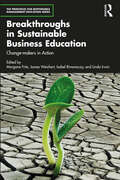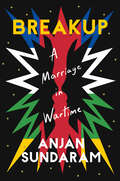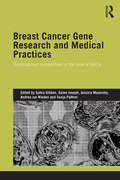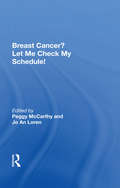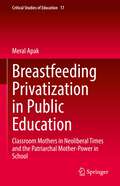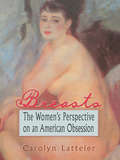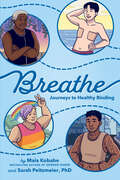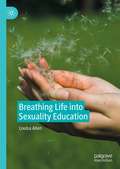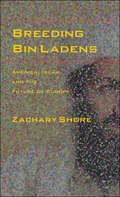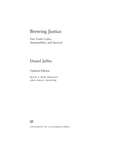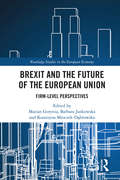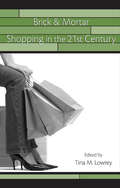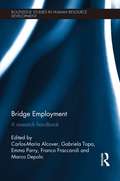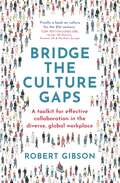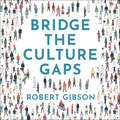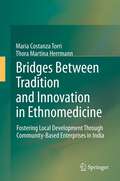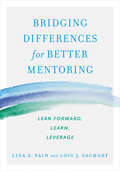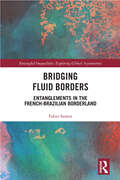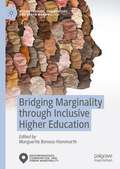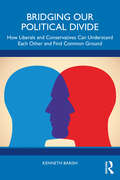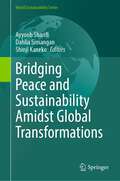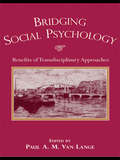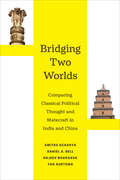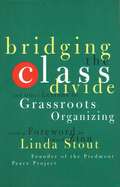- Table View
- List View
Breakthroughs in Sustainable Business Education: Change-makers in Action (The Principles for Responsible Management Education Series)
by Isabel Rimanoczy Linda Irwin Morgane Fritz James WeichertAround the globe, faculty and higher education leaders are actively changing what they teach to create a sustainable world. This book shares how to transition to programs and courses that teach sustainable business management practices critical for success.Students are demanding more than the same business courses taught for half a century. Faculty are wondering if they have the expertise to include sustainable business practices. Easy to read and relatable, this book provides tactical ideas for transitioning from current business curriculum to courses for a sustainable future. It compiles insights and recommendations from 28 global experts who have put ideas into practice. Each chapter addresses integration of sustainability topics into existing subject areas and offers ideas for adding new courses or concepts to ground business in the context of the global socio-environmental community.The book offers actionable ways that administrators and faculty can immediately begin transitioning their business curriculum to one that is socially and environmentally sustainable.
Breakup: A Marriage in Wartime
by Anjan SundaramAward-winning journalist Anjan Sundaram, hailed as &“the Indian successor to Kapuscinski&” (Basharat Peer) and praised for &“remarkable&” (Jon Stewart), &“excellent&” (Fareed Zakaria), and &“courageous and heartfelt&” (The Washington Post) work, must reckon with the devastating personal cost of war correspondence when he travels to the Central African Republic to report on preparations for a genocide hidden from the world, leaving his wife and newborn behind in CanadaAfter ten years of reporting from central Africa for The New York Times, Associated Press, and others, Anjan Sundaram finds himself living a quiet life in Shippagan, Canada, with his wife and newborn. But when word arrives of preparations for ethnic cleansing in the Central African Republic, he is suddenly torn between his duty as a husband and father, and his moral responsibility to report on a conflict unseen by the world.Soon he is traveling through the CAR, with a driver who may be a spy, bearing witness to ransacked villages and locals fleeing imminent massacre, fielding offers of mined gold and hearing stories of soldiers who steal schoolbooks for rolling paper. When he refuses to return home, journeying instead into a rebel stronghold, he learns that there is no going back to the life he left behind.Breakup illuminates the personal price that war correspondents pay as they bear witness on the frontlines of humanitarian crimes across the world. This brilliantly introspective, grounded account of one man&’s inner turmoil in the context of a dangerous journey through a warzone is sure to become a modern classic.
Breast Cancer Gene Research and Medical Practices: Transnational Perspectives in the Time of BRCA (Genetics and Society)
by Sahra Gibbon Galen Joseph Jessica Mozersky Andrea Zur Nieden Sonja PalfnerThe discovery of the two inherited susceptibility genes BRCA1 and BRCA2 in the mid-1990s created the possibility of predictive genetic testing and led to the establishment of specific medical programmes for those at high risk of developing breast cancer in the UK, US and Europe. The book provides a coherent structure for examining the diversity of practices and discourses that surround developments linked to BRCA genetics, and to the evolving field of genetics more broadly. It will be of interest to students and scholars of anthropology, sociology, history of science, STS, public health and bioethics. Chapter 8 of this book is freely available as a downloadable Open Access PDF under a Creative Commons Attribution-Non Commercial-No Derivatives 3.0 license. https://s3-us-west-2.amazonaws.com/tandfbis/rt-files/docs/Open+Access+Chapters/9780415824064_oachapter8.pdf
Breast Cancer? Let Me Check My Schedule!: Ten Remarkable Women Meet The Challenge Of Fitting Breast Cancer Into Their Very Busy Lives
by Peggy MccarthyThey come from different backgrounds and from professions as varied as medicine, education, and entertainment, but these ten women share one thing in common: They all have breast cancer. This book describes their experiences, exploring their initial fear, rage, and uncertainty, and reveals how each eventually coped, in her own way, with her diagnos
Breastfeeding Privatization in Public Education: Classroom Mothers in Neoliberal Times and the Patriarchal Mother-Power in School (Critical Studies of Education #17)
by Meral ApakThis book unveils women’s empowerment as mothers as a notion in the school system that reinforces patriarchy rather than weakening it. It discusses how empowerment is a contested notion, even though it is mostly praised in terms of women’s emancipation. This book explores the concept that although women are breastfeeding education as mothers in the neoliberal education system, they are not necessarily doing so as a self-sacrifice as one may generalize in the context of neoliberal economy. Instead, this book argues that women are doing this as a means of investment for gaining a sense of individual power, which ironically, reinforces patriarchal values. It presents demonstrative and descriptive practical incidences in the field.
Breasts: The Women's Perspective on an American Obsession
by Ellen Cole Esther D RothblumBreasts: The Women’s Perspective on an American Obsession describes and explores our national breast fetish, which is defined as a culturally constructed obsession that is deeply interwoven with beauty standards, breastfeeding practices, and sexuality. By tracing the complex history of this erotic fascination and discovering how it affects men’s and women’s sexuality and their relationships, this book will help women accept their breasts as they are and provide male readers with insight into how women think and feel about their bodies. This awareness will enable them to better understand and empathize with women’s experiences as objects of a cultural fetish.Focusing on adult joys and anxieties about breasts, sex, and breastfeeding, this text uses research and expert opinions from several different fields, including psychology, anthropology, sociology, mythology, and sexology. You will find several other issues in Breasts: The Women’s Perspective on an American Obsession that involve men’s and women’s struggles with this obsession, such as: breast implants human psychology and breasts beauty standards and breast sexuality how breasts are portrayed in mythology and art how ancient religions saw the breast as a sign of motherhood and giver of life ”breast men” debates on how and why the breast evolved adolescent girls and breasts breast activists, such as La Leche League, who are proponents of breastfeeding in publicThrough personal interviews with men and women, Breasts: The Women’s Perspective on an American Obsession also addresses women’s pride and shame about their breasts and their confusion about the attention their breasts receive. Ultimately, this exploration of breast obsession sheds light on our society’s general fear of and ambivalence toward women’s bodies. Breasts: The Women’s Perspective on an American Obsession shows you that breasts have a venerable history and urges you to see beyond the contemporary standards of visual perfection to give you an overall sense of the female body’s power and worth.
Breathe: Journeys to Healthy Binding
by Maia Kobabe Sarah PeitzmeierA graphic guide to chest binding with real-life stories and research-backed advice from bestselling Gender Queer author MAIA KOBABE and University of Michigan professor SARAH PEITZMEIER. Breathe arose from the need for a resource for folks considering chest binding as gender-affirming care. Dr. Peitzmeier interviewed twenty-five people of different ages and backgrounds about their journeys with binding, and then she and Kobabe combined excerpts from those interviews with evidence-based resources on binding into this extremely accessible guide. Breathe is both a practical resource for trans and nonbinary folks and an engaging and perspective-broadening read for anyone interested in what it means to be on a journey of expressing one&’s gender in ways that are joyful, healthy, and affirming.
Breathing Life into Sexuality Education
by Louisa AllenThis book seeks to re-envision the purpose and pedagogy of sexuality education, disrupting its conventional instrumental and health related aims. Predominately theoretical in nature, it presses at the traditional limits of sexuality education’s thought by drawing together ideas from disparate disciplinary fields including education, geography, sound studies and new materialist theory. The philosophical thought of Sharon Todd provides an anchor throughout, and is employed to reconceptualize sexuality education as sensuous event. The author calls for a reframing of the relationship of education and ethics, and explores what this means for sexuality education classrooms and relationships between and amongst teachers and students. The book explores pedagogies that invite new forms of student sensibility and open possibilities for engagement in sexuality education in currently uncharted ways. It will appeal to students and experienced academics conducting research related to sexuality, education, educational philosophy, queer studies and new materialisms.
Breeding Bin Ladens: America, Islam, and the Future of Europe
by Zachary ShoreOutstanding Academic Title for 2007, Choice MagazineWhile American leaders wage war on extremists in the Middle East, they are dangerously detached from a potentially greater threat closer to home. In Breeding Bin Ladens, Zachary Shore asserts that the growing ambivalence of Europe’s Muslims poses risks to national identities, international security, and the transatlantic alliance.Europe’s failure to integrate its Muslim millions, combined with America’s battered image in the Muslim world, have left too many Western Muslims easy prey for violent dogmas. Until America and Europe adopt new strategies, Shore argues, Europe will increasingly become the incubation ground for breeding new Bin Ladens. The United States continues to spend billions of dollars and lose thousands of its young men and women to combat Islamic extremists, a group estimated to be as small as fifty thousand. What Western leaders have not done, says Shore, is seek to understand the millions of moderate Muslims who live peacefully in the United States and Europe. Many in this extraordinarily diverse group are deeply ambivalent toward perceived Western values. Although they may admire America's economic or technological might, many are appalled by its crass consumerism, sexualization of women, lack of social justice, and foreign policies. Shore taps into this oft-ignored perspective through in-depth interviews with Muslims living across the European Union. He gives voice to people of deep faith who speak of the conflict between their desire to integrate into their adopted societies and the repulsion they feel toward some of what the West represents. Shore offers a deeply nuanced and hopeful consideration of Islam's future in the West. Cautioning Western leaders against an anti-terrorist tunnel vision that could ultimately backfire, Shore proposes bold, creative, and controversial solutions for attracting the hearts and minds of moderate Muslims living in the West.
Breeding Bin Ladens: America, Islam, and the Future of Europe
by Zachary ShoreA look into the state of Islam in Europe and the threat posed by excluding moderate Muslims in Western society.While American leaders wage war with extremists in the Middle East, they are ignoring a greater threat closer to home. In Breeding Bin Ladens, Zachary Shore asserts that the growing ambivalence of Europe’s Muslims poses risks to national identities, international security, and the transatlantic alliance.Europe’s failure to integrate its Muslim millions and America’s battered image in the Muslim world have left too many Western Muslims easy prey for violent dogmas. Until America and Europe adopt new strategies, Shore argues, Europe will increasingly become the incubation ground for breeding new Bin Ladens.The United States continues to spend billions and lose thousands of soldiers to combat Islamic extremists, a group estimated to be as small as fifty thousand. Meanwhile, Western leaders have not sought to understand the millions of moderate Muslims who live peacefully in the United States and Europe. Many in this extraordinarily diverse group are deeply ambivalent toward perceived Western values. Although they may admire America’s economic or technological might, many are appalled by its crass consumerism, sexualization of women, lack of social justice, and foreign policies.Through in-depth interviews with Muslims living across the European Union, Shore gives voice to people of deep faith who speak of the conflict between their desire to integrate into their adopted societies and the repulsion they feel toward some of what the West represents.Shore offers a consideration of Islam’s future in the West. Cautioning Western leaders against an anti-terrorist tunnel vision that could ultimately backfire, Shore proposes bold, creative, and controversial solutions for attracting the hearts and minds of moderate Muslims living in the West.
Brewing Justice
by Daniel JaffeeFair trade is a fast-growing alternative market intended to bring better prices and greater social justice to small farmers around the world. But what does a fair-trade label signify? This vivid study of coffee farmers in Mexico offers the first thorough investigation of the social, economic, and environmental benefits of fair trade. Based on extensive research in Zapotec indigenous communities in Oaxaca, Brewing Justice follows the members of the cooperative Michiza, whose organic coffee is sold on the international fair-trade market, and compares them to conventional farming families in the same region. The book carries readers into the lives of coffee-producer households and communities, offering a nuanced analysis of fair trade's effects on everyday life and the limits of its impact. Brewing Justice paints a clear picture of the dynamics of the fair-trade market and its relationship to the global economy. Drawing on interviews with dozens of fair-trade leaders, the book also explores the movement's fraught politics, especially the challenges posed by rapid growth and the increased role of transnational corporations. It concludes with recommendations to strengthen and protect the integrity of fair trade. This updated edition includes a substantial new chapter that assesses recent developments in both coffee-growing communities and movement politics, offering a guide to navigating the shifting landscape of fair-trade consumption.
Brexit and the Future of the European Union: Firm-Level Perspectives (Routledge Studies in the European Economy)
by Marian Gorynia; Barbara Jankowska; Katarzyna Mroczek-DąbrowskaFollowing the British referendum held on June 23, 2016, voters supported the withdrawal of the UK from the European Union (EU) (Brexit), a starting point for the third round of European crisis, following the eurozone debt crisis and the migration crisis. This volume provides an overview of the process and consequences of Brexit for EU member states, with an emphasis on possible future EU-UK relations, and a particular focus on countries in Central and Eastern Europe (CEE). The authors assess the extent to which firms in CEE states have already put in place strategies to counter the new economic reality post-Brexit and identify the strategies that firms are exploiting to better cope with the anticipated implications of Brexit. The book includes a ranking of countries most and least likely to be affected by Brexit; identification of the main determinants of the expansion of companies on the British market and the creation of a typology of strategies used by these companies in the face of Brexit. The book stands out as a complex and multidimensional research work that draws its roots from distinct yet simultaneously interlinked research areas. It will find a broad audience among academics and students across diverse fields of study, as well as practitioners and policy makers. It is a key reference for all those who want to better understand the complex nature of Brexit and its implications, not only for EU member states but, first and foremost, the business environment.
Brick & Mortar Shopping in the 21st Century
by Tina M. LowreyThis book explores how traditional retailing operates in the new competitive environment of a combined e-tailing and brick and mortar marketplace. In drawing together the cutting-edge research of a global group of experts in the field of consumer behavior, this volume addresses questions such as: which psychological theories can provide insights in
Bridge Employment: A Research Handbook (Routledge Studies in Human Resource Development)
by Franco Fraccaroli Emma Parry Carlos-María Alcover Gabriela Topa Marco DepoloWith the long-term trend toward earlier retirement slowing, and the majority of older workers remaining in employment up to and beyond statutory retirement age, it is increasingly important that we understand how to react to these changes. Bridge employment patterns and activities have changed greatly over the past decade, yet there is little information about the benefits of the various different forms this can take, both for employees and employers. This comparative international collection provides the first comprehensive summary of the literature on bridge employment, bringing together experiences from Europe, the United States, Canada, Australia and Japan. It identifies the opportunities, barriers and gaps in knowledge and practice, whilst offering recommendations on how organisations and individuals can cope with future challenges in aging and work. Written by international experts in the field, each chapter also makes substantive and contextualized suggestions for public policy and organizational decision-makers, providing them with a roadmap to implement and integrate bridge employment into policies and practices designed to prolong working life - a priority for workers, organizations and societies in the coming decades. This unique research handbook will be useful to a wide range of readers with an interest in the new concept of bridge employment and the extension of working life, and of interest to researchers and practitioners in organizational behavior, labor market analysis, human resource management, career development/counselling, occupational health, social economy and public policy administration
Bridge the Culture Gaps: A toolkit for effective collaboration in the diverse, global workplace
by Robert GibsonThe essential guide for working in diverse teams and across cultures today. This practical self-help guide will optimize the performance of individuals and teams working in an intercultural environment. By increasing awareness of the nature and impact of diversity in the workplace and national cultural differences, it demonstrates how to use the power of difference to achieve positive results for all. Learn how to mitigate unconscious bias to create inclusive organizations and how to use key cultural dimensions to communicate and cooperate in intercultural teams. Addressing the unique challenges of influencing across cultures and managing international transformation projects, this is an indispensable toolkit for a key competence in business.Leading interculturalist Robert Gibson challenges conventional ideas and makes new connections between culture, diversity and neuroscience in this modern guide for anyone working virtually or together in a diverse team or international business. Use these simple and proven approaches for better communication, collaboration, leadership and decision making in today's globalised workplace.
Bridge the Culture Gaps: A toolkit for effective collaboration in the diverse, global workplace
by Robert GibsonThe essential guide for working in diverse teams and across cultures today. This practical self-help guide will optimize the performance of individuals and teams working in an intercultural environment. By increasing awareness of the nature and impact of diversity in the workplace and national cultural differences, it demonstrates how to use the power of difference to achieve positive results for all. Learn how to mitigate unconscious bias to create inclusive organizations and how to use key cultural dimensions to communicate and cooperate in intercultural teams. Addressing the unique challenges of influencing across cultures and managing international transformation projects, this is an indispensable toolkit for a key competence in business.Leading interculturalist Robert Gibson challenges conventional ideas and makes new connections between culture, diversity and neuroscience in this modern guide for anyone working virtually or together in a diverse team or international business. Use these simple and proven approaches for better communication, collaboration, leadership and decision making in today's globalised workplace.(P) 2021 Hodder & Stoughton Limited
Bridges Between Tradition and Innovation in Ethnomedicine: Fostering Local Development Through Community-Based Enterprises in India
by Thora Martina Herrmann Maria Costanza TorriCommunity-based enterprises are the result of a process in which the community acts entrepreneurially to create and operate a new enterprise embedded in its existing social structure and network. This book argues that community-based enterprise could represent a strategy for fostering sustainable local development while at the same time maintaining traditional knowledge in ethnomedicine and conserving the local ecosystems.
Bridging Differences for Better Mentoring: Lean Forward, Learn, Leverage
by Lois J. Zachary Lisa Z. FainThis first comprehensive guide to helping mentors and mentees bridge gaps between and among cultures—a growing issue in today's diverse workplace—is coauthored by the founder and CEO of the Center for Mentoring Excellence.As the workplace has become more diverse, mentoring has become more challenging. Mentors and mentees may come from very different backgrounds and have limited understanding of each other's cultures and outlooks. But mentoring remains the most powerful tool for creating meaningful relationships, furthering professional development, and increasing engagement and retention. Younger workers and emerging leaders in particular are demanding it. Lisa Z. Fain and Lois J. Zachary offer a timely, evidence-based, practical guide for helping mentors develop the level of cultural competency needed to bridge differences. Firmly rooted in Zachary's well-known four-part mentoring model, the book uses three fictional scenarios featuring three pairs of diverse mentors and mentees to illustrate how key concepts can play out in real life. It offers an array of accessible tools and strategies designed to help you increase your self-awareness and prepare you to embrace and leverage differences in your mentoring relationships. But beyond tips and techniques, Fain and Zachary emphasize that authenticity is the key—the ultimate purpose of this book is to help the mentor and mentee make a genuine connection and learn from each other. That's when the magic really happens.
Bridging Fluid Borders: Entanglements in the French-Brazilian Borderland (Entangled Inequalities: Exploring Global Asymmetries)
by Fabio SantosInterweaving rich ethnographic descriptions with an innovative theoretical approach, this book explores and unsettles conventional maps and understandings of Europe and the Americas. Through an examination of the recently inaugurated cross-border bridge between France’s overseas department of French Guiana and Brazil’s northern state of Amapá, which effectively acts as a one-way street and serves to perpetuate inequalities in a historically deeply entangled region, it foregrounds the ways in which borderland inhabitants such as indigenous women, illegalised migrants, and local politicians deal with these inequalities and the increasingly closed Amazonian border in everyday life. A study that challenges the coloniality of memory, this volume shows how the borderland along and across the Oyapock River, far from being the hinterland of France and Brazil, in fact illuminates entangled histories and their concomitant inequalities on a large scale. As such, it will appeal to scholars of sociology and border studies with interests in postcolonialism, memory, and inequality.
Bridging Marginality through Inclusive Higher Education (Neighborhoods, Communities, and Urban Marginality)
by Marguerite Bonous-HammarthThis book examines the changing influences of diversity in American higher education. The volume offers evidence and recommendations to positively shape inclusive learning and engagement of students, faculty, staff and community across the complex terrains of urban, suburban, and rural organizations within higher education today. Chapters highlight critical collaborations across student affairs and academic affairs, and delve into milestones addressing access, retention, engagement, and thriving within distinctive institutional types (e.g., research, liberal arts, community colleges, Minority Serving Institutions). Authors also explore the nuanced changes occurring against the contemporary backdrop of COVID-19 experiences – including the rise of anti-Asian racism, the salience of implicit biases, and the disparate access to and impacts of health services. Essential chapters refocus our consideration about the trajectories of historically underrepresented groups and their peers (including, African Americans, Hispanic/Latino, Indigenous people, individuals with disabilities and those identifying as LGBTQ+, undocumented students, and women) in American higher education.
Bridging Our Political Divide: How Liberals and Conservatives Can Understand Each Other and Find Common Ground
by Kenneth BarishBridging Our Political Divide: How Liberals and Conservatives Can Understand Each Other and Find Common Ground is an essential contribution to a better national conversation.Psychologist Kenneth Barish explains the sources and consistencyof our political beliefs and why we continue to disagree about fundamental issues in American life. He offers antidotes to the angry, repetitive, and unproductive arguments that now dominate our political culture. Barish teaches us how to listen, think, and speak about our political opinions in a way that allows us to understand each other’s concerns, resist false dichotomies and ideological certainty, see new perspectives and possibilities, and find common ground. The concluding chapter shows how we can move beyond partisan divisions toward pragmatic solutions and a better future for America’s children.This fundamentally hopeful book should be read by students in all areas of study, by professionals in the fields of conflict resolution, communication, political science, and social psychology, and by anyone seeking to improve the quality of their conversations with people who may disagree with them, in both politics and in their personal relationships.
Bridging Peace and Sustainability Amidst Global Transformations (World Sustainability Series)
by Shinji Kaneko Ayyoob Sharifi Dahlia SimanganThis book is the sequel to a well-received book titled ‘Integrated Approaches to Peace and Sustainability’ that aims to further advance the understanding of the dynamic interactions between various components of peace and sustainability. How are peace and sustainability linked to each other, and what are the key parameters that define the nexus between them? This book addresses those questions through a combination of theoretical studies and empirical research that contextualize peace and sustainability issues amid global transformations. The conceptual and empirical linkages between peace and sustainability are widely recognized in academic and policy circles. The adoption of the 2030 Agenda for Sustainable Development confirms this recognition. However, many of the initiatives on peace and sustainability operate in silos, undermining the positive and mutually reinforcing relationship between them. Enhanced integration of peace and sustainability components is imperative for addressing complex challenges that come with global transformations that are manifested environmentally, socially, politically, and economically across levels. It is, therefore, crucial to identify the pathways that enhance the peace-promoting potential of sustainability and the sustainability-promoting potential of peace. The contributions in this edited book elaborate on such pathways by offering insights related to different social, economic, and environmental aspects of the peace-sustainability nexus. Given its inter- and trans-disciplinary focus, the book is of interest to policymakers and researchers working in different areas of peace and sustainability. It contributes to ongoing academic and policy discussions surrounding the outcomes of and challenges to achieving the Sustainable Development Goals (SDGs), particularly SDG 16 on peace, justice and strong institutions.
Bridging Social Psychology: Benefits of Transdisciplinary Approaches
by Paul A. M. Van LangeBridging Social Psychology illuminates the unique contribution the field of social psychology can bring to understanding major scientific and societal problems. The book focuses on illustrating the benefits and costs of bridging social psychology with other fields of psychology, including cognitive, developmental, and personality psychology, as well as other disciplines such as biology, neuroscience and economics. The editor’s hope is that the examination of these bridges will result in new theoretical, methodological, and societal benefits. The 65 essays, written by eminent leaders in the field, demonstrate the relationship of social psychology with: (1) biology, neuroscience and cognitive science; (2) personality, emotion, and development; (3) relationship science, interaction, and health; and (4) organizational science, culture, and economics. The book also examines the key assumptions of social psychology, where the field is headed, and its unique contribution to basic theoretical and broad societal questions (e.g. promoting health in society). Section introductions tie the book together. The book concludes with an enlightening Epilogue by Walter Mischel.This book will appeal to scholars, researchers, and advanced students in social psychology wishing to demonstrate the cross-disciplinary aspect of their research. It will also be of interest to those in neighboring fields of psychology, especially personality, organizational, health, cognitive, and developmental psychology, as well as those in neuroscience, biology, sociology, communication, economics, political science, and anthropology. The user-friendly tone makes the book accessible to those with only a basic knowledge of social psychology. The book also serves as a text for advanced courses in social psychology and/or applied psychology. A helpful table, found on the book’s Web site, indicates the cross-disciplinary applications addressed in each essay, to make it easier to assign the book in courses.
Bridging Two Worlds: Comparing Classical Political Thought and Statecraft in India and China (Great Transformations #4)
by Amitav Acharya, Daniel A. Bell, Rajeev Bhargava, and Yan XuetongA free open access ebook is available upon publication. Learn more at www.luminosoa.org. The rise of China and India could be the most important political development of the twenty-first century. What will the foreign policies of China and India look like in the future? What should they look like? And what can each country learn from the other? Bridging Two Worlds gathers a coterie of experts in the field, analyzing profound political thinkers from these ancient regions whose theories of interstate relations set the terms for the debates today. This volume is the first work that systematically compares ancient thoughts and theories about international politics between China and India. It is essential reading for anyone interested in the growth of China and India and what it will mean for the rest of the world.
Bridging the Class Divide and Other Lessons for Grassroots Organizing
by Linda StoutStout describes what it was like starting and running the Piedmont Peace Project, a community organization geared toward improving the lives of low-income people in the Piedmont region of North Carolina. She gives advice for other community organizers, particularly those with diverse backgrounds and/or lack of formal education.
